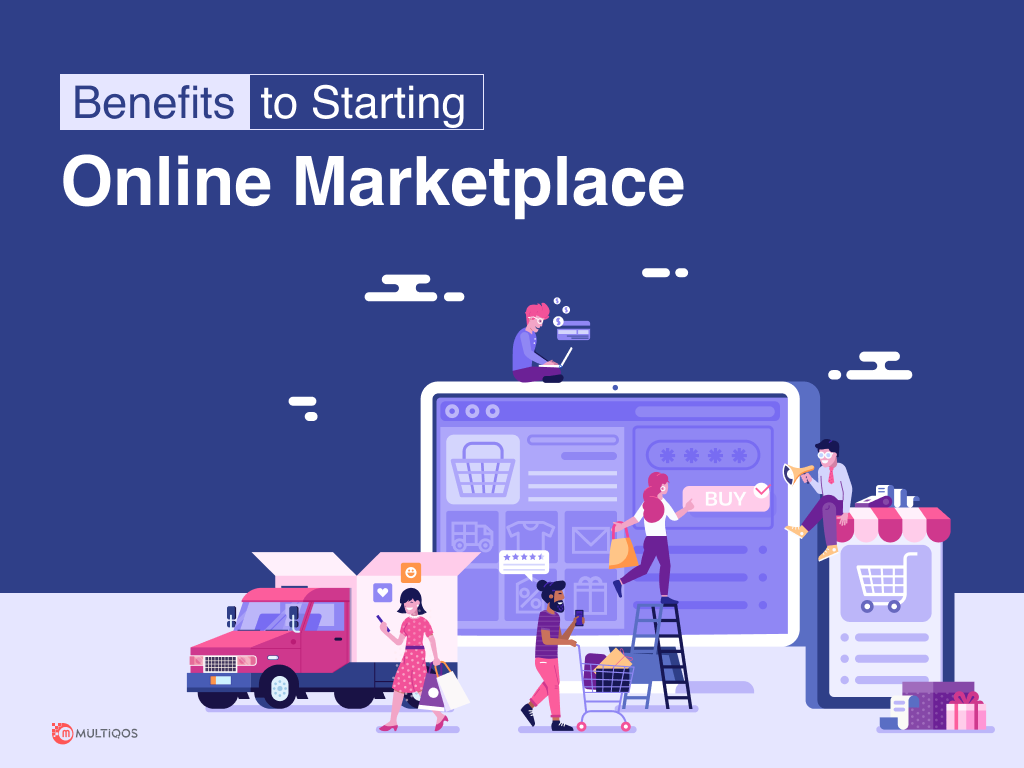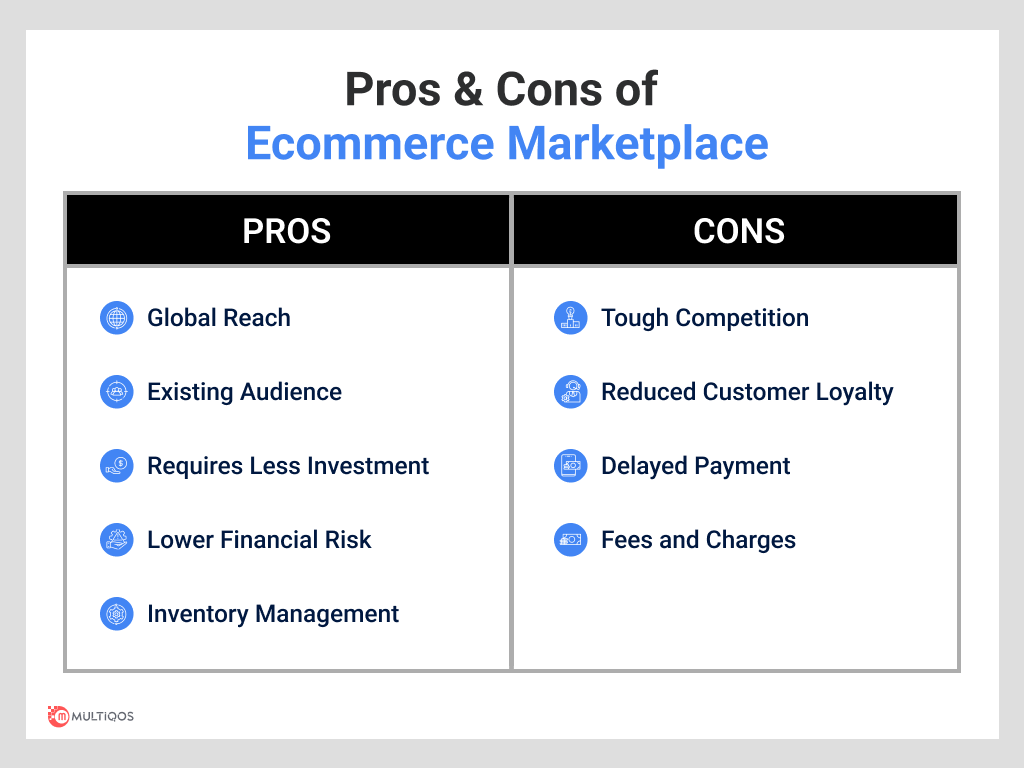Advantages of Starting Online Marketplace in 2025

Overview
These days, users (buyers, potential customers) are connected to a range of sellers (vendors, merchants) through an online platform that allows them to shop and engage in one location. By minimizing the time it takes to discover certain items, the shared area improves productivity. Online markets are operated by marketplace operators. These organizations guarantee that transactions go smoothly, that payments are made to the proper parties, and that customers receive the services they expect.
But how can you determine an online marketplace?
Well, there are four core features that define a marketplace:
- Customers may buy from a variety of third-party vendors on a single marketplace
- Users can pay and submit orders on the very same platform.
- A marketplace’s founder normally does not provide any products and does not have a warehouse to hold products, but is in charge of processing transactions.
- The owner usually invests in the creation of an online marketplace in order to increase profit by monetizing. It can, for example, charge businesses a fee/percentage of revenues to use a marketplace as a convenient option for attaining business goals.
As a result, an online marketplace development can include a variety of businesses in addition to online retailing and e-commerce platform development, such as e-learning, tourism, healthcare, finance, and even house renting.
Examples of Online Marketplaces
Here are a few examples of the best eCommerce development platforms or top-most ecommerce website development platforms of the online marketplace:
- Amazon, Walmart, eBay, Alibaba.com, Wayfair, Newegg, Bonanza, and Lamoda are all e-commerce sites.
- Airbnb and Booking.com are two sites where you may rent a home.
- Upwork, Freelancer, and Fiverr are examples of freelancing and creative services.
- Avvo provides legal services.
- Medical — Zocdoc
- Coursera, Udemi, Study Academy, and One Education are examples of e-learning platforms
You must also remember that digital commerce platforms can also be classified as business-to-business (B2B) and business-to-consumer (B2C).
Comparing a Traditional Retailer and an Online Marketplace
The process of transferring products and services on the basis of money is known as traditional commerce. It entails negotiating with all parties in-person to carry out the trade of products and services at predetermined rates.
On the contrary, an online marketplace developed by an online marketplace development company is a platform for conducting the process of exchanging digital items and services, with payment for such goods and services occurring in an electronic format. The platform allows its clients to buy goods and services from the comfort of their own couch, with a few discounts, and have them delivered to their doorstep.
What Do Small Businesses Gain from Joining Online Marketplaces?
Convenience and Effectiveness
The smoother it is for a client to locate what they want, the more likely they are to purchase what you’re selling. Marketplaces also manage online orders, shipping fulfillment, and customer service. Due to the obvious convenience and efficiency of online buying, people are more likely to order from a company when they are less inclined to visit a physical site.
Expertise in Digital Marketing
Digital marketing specialists that use search engine optimization (SEO) tactics are frequently employed by online marketplaces. This implies that relevant search keywords like “best craft cheese in NYC” or “best local butcher in Boston” are more likely to bring your business to the top of the search results, making your items more visible and discoverable.
Reduction in Costs
Merchants that register for those platforms can avoid the high expenses involved with recruiting their own specialists or extending their staff needlessly because the marketplace operators hire their own professionals.
Merchants may, thus, focus more time, attention, and resources on other elements of their business when they don’t have to worry about these activities. The barriers to trade for potential company owners and managers wishing to establish their own firm are lower in this atmosphere. They are able to begin their company and establish an internet presence with fewer overheads and out-of-pocket expenses.
Recognition of Loyal Customers
Customers tend to return to the community for their product demands if online marketplaces attain better consumer awareness and loyalty. You’ll have more recurring clients since they’ll know where to locate your business and what you sell.
Attain a Competitive Edge
Entering an online marketplace business allows you to compare prices side by side and maintain your rates competitive. You’ll be able to monitor and assess the competition better if you compare the same niche of products with merchants in your neighborhood that provide the same or comparable items. Additionally, as the number of internet consumers grows, so do sales.
Improvement in Online Reviews
Consumers can use online marketplaces to critique merchants’ services. Good customer reviews (e.g. on Yelp, Google results, etc.) are critical to a business’s success and can have a significant influence on sales (for better or worse). Participating companies are sometimes required by marketplaces to attain a particular rating from websites like Yelp, guaranteeing that the groceries are of good quality and perceived value approved. Increased client trust in your items will result in a flood of new customers, not just for your digital marketplace but also for your local store.
Access to Data
Due to the ability of consumers to evaluate businesses and items, merchants and shop managers may accurately assess which products are highly rated blockbusters and which things are duplicate stocks (or take up unnecessary shelf space). Stores may utilize this information to swiftly move items in and out of circulation, as well as expand product inventory as needed. Additionally, businesses obtain information such as the best sales hours and customer information (where or what could they use? What is the average shopping value? What are the trends in products?). This increased clarity and information can help merchants improve their sales strategy.
Also Read: How Much Does it Cost to Build a Marketplace in 2025
Why Choose Online Marketplace for Local Business?
An online marketplace is advantageous for local companies for a variety of reasons. Starting an internet business does not necessitate a large sum of money. Furthermore, on a digital platform, marketing is quite straightforward. The client may quickly contact the local company owner and see their stuff. Customers may also quickly browse all of the goods. Further, it also reduces operating costs because critical operations are automated on an internet platform.
Advantages of an Online Marketplaces for Local Business
The following are a few of the potential advantages of e-marketplace or website development for marketplace:
- It offers a trusted additional channel for marketing and selling your products
- It cuts down marketing costs considerately compared to the other sales channels
- It opens up new avenues for international sales – online marketplace development has been seen in the areas of home ware, pets, fashion, and athletic goods.
- It provides a handy method for buyers and sellers to compare prices and items from a single source.
- As a part of the market, a well-known online marketplace establishes a level of trust between you and the buyer
- It delivers impartial reviews of your products and services that may inspire new customers to buy
- It brings in opportunities to form different trade collaborations with market participants and distributors, either in your supply chain or across other supply chains;
- It promises to increase transparency as the online marketplace is an inclusive environment, availability, pricing, and stock levels are visible
- It is feasible to work around the clock – time limits and challenges with shifting international trade conditions
Disadvantages of Online Marketplaces
There are a lot of substantial benefits of selling on a marketplace, but there are also some possible disadvantages of marketplace to consider.
- Marketplaces can charge a commission on each sale, with rates varying from one site to the next. Knowing and understanding the marketplace’s price structure before selling your items there.
- The online retailers may set restricted terms of the agreement in respect of how you may connect with consumers. See costs for selling on Amazon and fees for selling on eBay.
- There may be constraints on how your company may brand its internet presence in the market.
Summing It Up
Online marketplace creation is a terrific way to make money if you want to link suppliers and customers on a single platform, especially keeping in mind the advantages and disadvantages of online marketplace. This sort of software solution has grown in popularity throughout the world since it allows enterprises and individual professionals to easily establish a business while reaching a big audience.
In this digitized world, since businesses and consumers equally need convenience and a dependable venue to buy and sell items, online marketplace are the perfect saviors in 2025. The platforms for marketplaces may cater to almost any specialty and solve any demand. It allows sellers to improve user experience to allow customers to compare pricing and features, as well as read customer reviews and ratings. Furthermore, third-party sellers are not required to spend for the mobile app development of their own website or for website development services. You can also contact MultiQoS as one of the best ecommerce website development company.
Looking to Build A Marketplace App?
From UI/UX design and development to marketing and analytics, our expert team offers a comprehensive solution for your marketplace app development needs.
FAQ on Marketplace Application Development
An operator owns and operates an online marketplace, and is responsible for managing and deriving business value from it. They provide third-party vendors access to the marketplace in exchange for a percentage of their sales.
When it comes to target audiences, marketplaces are divided into three categories: business-to-business (B2B), business-to-customer (B2C), and peer-to-peer (P2P), also known as customer-to-customer (C2C).
A marketplace can be built and managed by any B2C retailer which actually sells. However, as the economy is expanding, marketplaces are becoming more accessible to B2B online marketing as well.
Anything that is lawful. With the help of the E-commerce marketplace development agency, you may sell four different sorts of items: digital products, event tickets, physical products, and non-digital things. Clothing, home & garden items, jewelry, pharmaceuticals, eBooks, programs, janitorial services, courses, and more are all available for sale.
Get In Touch





